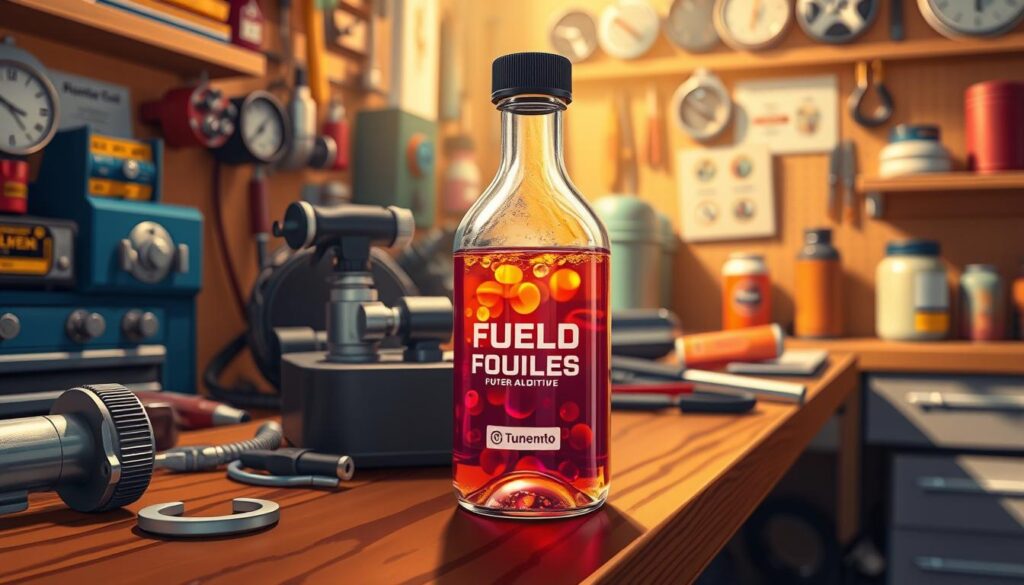Fuel additives are chemicals added to gasoline to boost vehicle performance or keep systems running well. They help clean systems, improve fuel flow, lubricate parts, prevent gas from freezing, and keep gas fresh for a long time. While many fuels at gas stations already have additives, owners can also add their own.
Using aftermarket fuel additives can come with risks. It’s key to think about your car’s age, condition, and what the maker suggests before adding them. This helps avoid any problems.
Contents
- 1 What Are Fuel Additives and How Do They Work?
- 2 Preblended vs. Aftermarket Fuel Additives
- 3 Are there any risks associated with using aftermarket fuel additives?
- 4 Benefits of Using Fuel Additives
- 5 Choosing the Right Fuel Additive
- 6 Proper Use and Maintenance with Fuel Additives
- 7 Testing and Research on Fuel Additive Effectiveness
- 8 When to Use Fuel Additives
- 9 Source Links
Key Takeaways
- Aftermarket fuel additives can potentially carry risks for vehicle performance and systems.
- Factors like vehicle age, condition, and manufacturer recommendations should be considered before using fuel additives.
- Pre-blended fuels often contain additives, while aftermarket additives are added separately by the vehicle owner.
- Fuel additives can serve various purposes, such as cleaning, improving flow, lubricating, and preserving gasoline.
- It’s important to research reputable brands and follow instructions when using any fuel additives.
What Are Fuel Additives and How Do They Work?
Fuel additives are special chemicals added to gasoline or diesel to make vehicles run better. They help with many issues, like making combustion more efficient and stopping fuel from breaking down. They also protect against corrosion.
Fuel Additives Explained
There are many types of fuel additives. You can find fuel system cleaners, octane boosters, fuel stabilizers, and more. Each type has a unique job to do. They help improve how engines work, make fuel system parts last longer, and solve problems that drivers face.
Types of Fuel Additives
- Fuel System Cleaners: These additives clean out the fuel system. They remove deposits from fuel injectors, intake valves, and combustion chambers. This makes the engine run better and use less fuel.
- Octane Boosters: Octane boosters increase the octane level of gasoline. This is good for engines that need high-octane fuel to run smoothly. It helps prevent engine knocking and pre-ignition.
- Fuel Stabilizers: Fuel stabilizers keep fuel from breaking down over time. They are useful for vehicles that sit idle for a while or are used only occasionally. They stop fuel from turning into gum or varnish.
- Ethanol Additives: Ethanol is in most US gasoline. These additives help fight the bad effects of ethanol, like causing fuel to separate and absorb water. This keeps the fuel running well and stops corrosion.
- Corrosion Inhibitors: Corrosion inhibitors protect the fuel system and metal parts from water, oxygen, and acids. These can form in the fuel and cause damage.
- Diesel Anti-Gel Additives: These additives stop diesel fuel from freezing up in the cold. They make sure the fuel stays liquid and don’t clog the fuel filter.
Knowing about the different fuel additives and what they do helps car owners take better care of their vehicles. It helps solve problems and keep the engine running smoothly.
| Fuel Additive Type | Function | Typical Use |
|---|---|---|
| Fuel System Cleaners | Dissolve and remove deposits in the fuel system | Improve fuel efficiency and engine performance |
| Octane Boosters | Increase the octane rating of gasoline | Prevent knocking and pre-ignition in high-performance engines |
| Fuel Stabilizers | Prevent fuel degradation over time | Maintain fuel quality in vehicles and equipment with intermittent use or long storage periods |
| Ethanol Additives | Combat the negative effects of ethanol in gasoline | Prevent fuel separation and water absorption |
| Corrosion Inhibitors | Protect fuel system and metal components from corrosion | Prevent damage caused by water, oxygen, and acids in the fuel |
| Diesel Anti-Gel Additives | Prevent fuel from gelling or waxing in cold temperatures | Ensure smooth operation and prevent fuel filter clogging in diesel engines |
Preblended vs. Aftermarket Fuel Additives
Drivers have two main choices for fuel additives: preblended or aftermarket. Preblended fuel additives are added to the fuel at the refinery or gas station. They come with a tested blend that meets industry standards. This makes them convenient for drivers since the additives are already in the fuel.
Aftermarket fuel additives are bought separately and added by the driver. They let you customize the fuel but need an extra step when refueling. Choosing between preblended and aftermarket additives depends on how much control you want and your vehicle’s needs.
- Preblended fuel additives are mixed into the fuel at the refinery or gas station, offering consistent quality and meeting industry standards.
- Aftermarket fuel additives are purchased separately and added manually, providing more customization but requiring an additional step during refueling.
- The choice between preblended or aftermarket fuel additives depends on the level of control desired and the specific needs of the vehicle.
“High quality diesel fuels from reputable providers are stated to contain necessary baseline additives like cetane improvers, lubricity improvers, corrosion inhibitors, conductivity improvers, and cold flow additives, which are essential for maintaining adequate fuel performance.”
The choice between preblended or aftermarket fuel additives is up to you and what your vehicle needs. Both have their benefits and drawbacks. Knowing the differences can help you make a better choice.

Are there any risks associated with using aftermarket fuel additives?
Fuel additives can make your engine run better and help you save on fuel. But, they also come with risks. It’s key to know these risks and think them over before adding any fuel additive to your car.
Potential Risks of Using Aftermarket Fuel Additives
Adding a fuel additive to a troubled engine might make things worse. Older cars or engines with issues might not like fuel additives. Using the wrong additive could harm your engine or fuel system. Not all additives work with every car, leading to compatibility problems.
Considerations Before Using Fuel Additives
- Check the vehicle manufacturer’s advice to make sure the additive fits your car.
- Have your engine checked for problems before adding a fuel additive to avoid making things worse.
- Think about your car’s age and condition before using fuel additives.
- Look at how you drive and use your car to see if fuel additives will work well for you.
Understanding the risks and thinking about these factors can help make using fuel additives safe and good for your car. Talking to a trusted mechanic or the car maker can also give you good advice.
| Statistic | Value |
|---|---|
| Time for technician to pour in fuel additives | 1 minute |
| Fuel additives recommended by Havoline® xpress lube® owner | Chevron’s Techron® Complete Fuel System Cleaner and Techron® Diesel Fuel System Cleaner |
| Years of experience with Chevron Lubricants | Over 25 years |
“Trust and reputation are the most valuable assets for successful and experienced operators.”
Benefits of Using Fuel Additives
Using aftermarket fuel additives can have both good and bad sides. But, the right use of these additives brings big benefits. They help improve engine performance, increase fuel efficiency, and offer other advantages for car owners.
Improved Engine Performance
Fuel additives clean and keep parts like fuel injectors and valves working well. This makes fuel burn better, giving you more power and a smoother ride.
Increased Fuel Efficiency
Some fuel additives cut down on deposits and help fuel flow better. Studies show cars using additives like Top Tier detergents use less fuel than cars without them.
| Benefit | Description |
|---|---|
| Improved Engine Performance | Fuel additives clean and maintain critical engine components, leading to more efficient combustion and power delivery. |
| Increased Fuel Efficiency | Fuel additives can reduce deposits and improve fuel flow, resulting in enhanced fuel economy for the vehicle. |
Using fuel additives can make your engine run better, save fuel, and cut down on repair costs. It also helps the environment by reducing emissions.

Choosing the Right Fuel Additive
Choosing the right fuel additive for your car is key. Each car brand has its own advice on fuel additives. It’s smart to look at your owner’s manual or talk to a certified dealer to pick the right one for your car.
Think about your car’s age, mileage, and how you drive it when picking a fuel additive. This helps you find a product that meets your needs and is safe.
Follow Manufacturer Recommendations
Your car’s maker knows best about fuel additives. They test and recommend additives that fit your car’s engine and fuel system perfectly.
- Check your owner’s manual for specific guidance on compatible fuel additives.
- Consult with a certified dealership or mechanic to determine the right fuel additive for your vehicle.
- Consider the age, mileage, and driving conditions of your vehicle when selecting a fuel additive.
Researching and choosing the right fuel additive is important. It helps you get the most benefits and keeps your car’s engine and fuel system healthy.
Proper Use and Maintenance with Fuel Additives
Using fuel additives right is key to getting the most out of them and keeping your car running well. Always follow the maker’s guide on how to use fuel additives. This usually means adding it to the tank when it’s a quarter full, then filling it up. This helps the additive mix well with the fuel.
Fuel additives don’t work right away. It might take a few tanks to see the full benefits. Using them regularly and keeping up with maintenance, like changing fuel filters, is crucial. This keeps your engine and fuel system in top shape over time.
To get the best from your fuel additive buy, keep these fuel additive application guidelines in mind:
- Stick to the dosage instructions given by the manufacturer for your car and fuel type.
- Put the fuel additive in the tank when it’s a quarter full for best mixing.
- Keep using the fuel additive regularly, as it might take a few tanks to see the best results.
- Regular maintenance, like changing fuel filters, helps the fuel additives work better.
Following these guidelines for using fuel additives helps your car run smoothly and efficiently. It also makes your engine and fuel system last longer. Remember, taking good care of your car is important when using fuel additives.
“Fuel additives can be a valuable tool for maintaining engine health, but they shouldn’t be used as a substitute for essential maintenance services like oil changes and inspections.”
Testing and Research on Fuel Additive Effectiveness
Fuel additive companies claim their products boost performance and efficiency. But, it’s key to look at independent research and tests to see if these claims are true. Many studies have looked into how well fuel additives work, giving us useful info for buyers.
Independent Studies on Fuel Additives
A 2016 study by AAA showed that cars running on Top Tier fuel with additives had cleaner engines than those on regular gas. This means some additives can keep engines clean and might even boost performance.
But, a study by the National Center for Vehicle Emissions Control and Safety at Colorado State University found no short-term mileage gains with an Additech fuel additive. This shows that how well additives work can depend on the product, the car, and how you drive.
| Fuel Additive | Fuel Efficiency Improvement | Engine Cleanliness |
|---|---|---|
| Top Tier Fuel with Detergents | N/A | Fewer Carbon Deposits |
| Additech Fuel Additive | No Short-Term Improvement | N/A |
The results of fuel additives can really vary. So, it’s important to check out credible, outside research before deciding on their benefits. Buyers should be wary of what fuel additive companies say and look for solid evidence of how well they work.
When to Use Fuel Additives
Fuel additives can be helpful in some situations. Their effectiveness depends on the vehicle’s age, condition, and how often it’s driven. New, well-kept vehicles might not see much improvement from additives. But older or high-mileage cars can benefit a lot, as additives clean deposits and boost performance.
For cars that sit idle or are driven less often, fuel additives are a good idea. They help keep the fuel fresh and prevent problems like algae growth. Algae can clog filters and harm fuel injectors.
Before adding any additive to your fuel, check the car maker’s advice. Some additives work better for certain engines or fuel systems. Picking the right fuel additive is key. Knowing the best times to use fuel additives and following the right fuel additive application guidelines helps get the most out of them and avoids risks.
Source Links
- https://www.bramanmiamihyundai.com/blog/2024/may/23/should-you-use-fuel-additives.htm – Should You Use Fuel Additives?
- https://www.longolexus.com/blogs/3079/car-tips/what-happens-if-you-add-additives-to-gasoline/?srsltid=AfmBOop-1dJuutqlNQ_80Zz7Mu8l7YdhtfVRF0Crd0lPKi93Zq-UUgPB – What Happens If You Add Additives to Gasoline? (Explained)
- https://www.jeepgarage.org/threads/are-there-any-fuel-and-or-oil-additives-that-are-actually-beneficial-and-not-just-a-scam.222674/ – Are there any fuel and/or oil additives that are…
- https://rislone.com/blog/fuel-system/what-are-fuel-additives-and-how-do-they-work/ – What Are Fuel Additives and How Do They Work? | Rislone
- https://living.geico.com/driving/auto/auto-care/fuel-additives/ – Fuel Additives: What Are They & Do They Work?
- https://www.fleetmaintenance.com/in-the-bay/fluids-and-chemicals/article/21160079/exxon-mobil-lubricants-diesel-fuel-additive-considerations – Guest Blog: Diesel fuel additive considerations
- https://oiengine.com/fuel-additives/ – Do Diesel Fuel Additives Really Work?
- https://www.pilotsofamerica.com/community/threads/aeroshell-anti-wear-additives-vs-camguard.125670/ – Aeroshell anti-wear additives vs Camguard
- https://www.chevronlubricants.com/content/dam/external/havoline/en_us/sales-material/all-other/Chevron-FromOurPartners_Final_December2020.pdf – 10_FromOurPartners-new.indd
- https://www.fuelox.com/do-fuel-additives-really-work/?srsltid=AfmBOorgs_7NF8oZ4X5YLwJgRNnvmySKE7VyjpP8CRVi_X_Zz_q3y4Dx – Do Fuel Additives Really Work? | Fuel Ox
- https://napacarcare.com/auto-repair-tips/understanding-different-fuel-additives-for-car/ – Understanding The Different Fuel Additives For A Car | McCullough NAPA Auto Care
- https://www.machinerylubrication.com/Read/29836/aftermarket-oil-additives – Pros and Cons of Aftermarket Oil Additives
- https://store.advancedenginetech.com/blogs/blog/how-fuel-additives-work – How Fuel Additives Work: Guide to Improve Vehicle’s Lifespan %%page%% %%sep%% %%sitename%%
- https://rawze.com/forums/showthread.php?tid=112 – Rawze’s thoughts on Fuel Additives…
- https://www.fleetmaintenance.com/in-the-bay/fluids-and-chemicals/article/21280212/oil-and-fuel-additives-for-heavy-duty-commercial-vehicles – Do the benefits of additives really add up?
- https://www.longolexus.com/blogs/3079/car-tips/what-happens-if-you-add-additives-to-gasoline/?srsltid=AfmBOooqoPd8IxZsHwEjNbhuh2lJ9GEA8TK6pPfafUHy2y1V3ukXOig6 – What Happens If You Add Additives to Gasoline? (Explained)
- https://www.odyclub.com/threads/honda-fuel-additives.374416/ – Honda & fuel additives (?)
- https://www.nerdwallet.com/article/loans/auto-loans/do-fuel-additives-work – Do Fuel Additives Work? – NerdWallet
- https://www.fleetowner.com/operations/maintenance/article/21683452/the-truth-about-fuel-additives – The truth about fuel additives
- https://www.k1600forum.com/threads/gasoline-additive-web-info-the-search-for-the-best-way-to-cure-the-crud.4670/ – Gasoline Additive Web Info – The search for the best way…
- https://rawze.com/forums/archive/index.php?thread-112.html – Rawze.com: Rawze’s ISX Technical Discussion and more
- https://www.bellperformance.com/blog/do-fuel-additives-really-work – Do fuel additives really work?

Hi, I’m Sufiyan, the developer behind this platform. I created FuelConsumptionCalculator.com to simplify fuel tracking for everyone — because understanding your vehicle shouldn’t require a degree in mechanics. I’m always working on adding more tools and content to make this site even more useful

